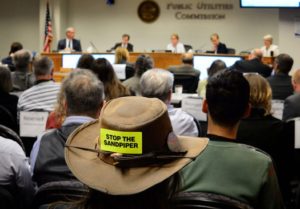
A 2015 Minnesota Public Utilities Commission meeting took testimony on whether Enbridge has proven the need for Sandpiper oil pipeline, which will cross some environmentally sensitive areas. An anti-pipeline Native American environmental Credit: Glen Stubbe/Star-Tribune
A 2015 Minnesota Public Utilities Commission meeting took testimony on whether Enbridge has proven the need for Sandpiper oil pipeline, which will cross some environmentally sensitive areas. An anti-pipeline Native American environmental group Honor the Earth protested outside, and then many members attended the hearing.
Enbridge Energy Partners has essentially pulled the plug on the controversial Sandpiper pipeline in northern Minnesota, just a few weeks after announcing it’s buying a stake in a different pipeline that doesn’t cross the state.
Calgary-based Enbridge is withdrawing its state application for the $2.6 billion Sandpiper. It’s asking for an end to regulatory proceedings, including work on an environmental-impact statement, according to documents […]











One can only hope (and write letters, make calls, stand with the protectors) that Dakota
Access (Enbridge) is halted in ND. Their proposal there includes going under the Missouri and through land that the Native population has not given sanction to. Yes, permits were granted, but without doing the necessary environmental impact studies. This action and intent is under court purview now. I stand with the Native Americans, now numbering 4000, who do not want our waterways interfered with. When Northern Bismarck found the dangers initially to this plan, they passed it to the south, away from white communities. Clearly, their racism is involved, once again.